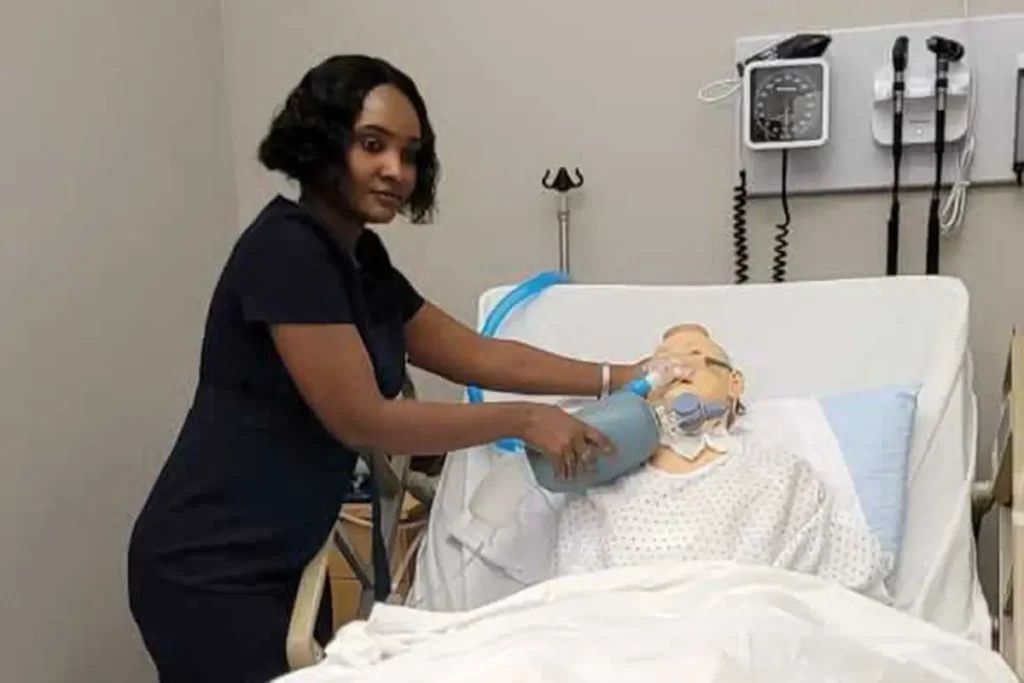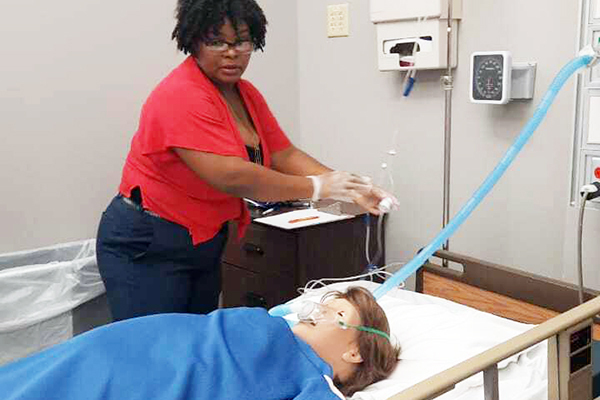Nurse Educators Take Skills Learned in Boston Back to Haiti

Hands-on experience gained in simulation labs will strengthen nurse training
Posted on Aug 8, 2022

Longtime nurses Claudinette Favard and Nathalie Paul have seen a lot in their combined 27 years supporting patients and teaching nursing students in Haiti. But after nearly two weeks of training at Regis College outside of Boston, they realized something new.
“Here things are different,” said Paul, who, since 2014, has served as a clinical nurse educator at Hôpital Universitaire de Mirebalais, the more than 300-bed facility run by Zanmi Lasante, Partners In Health’s sister organization in Haiti. “[In the U.S.], nursing students spend a lot of time in the simulation lab learning skills. In Haiti, they go to the lab once in the first and second year, and after that they only go to the hospital because they are needed to help care for the patients.”
The two nurse educators, both affiliated with Zanmi Lasante’s Nursing Center of Excellence at Hôpital Universitaire de Mirebalais, say they will bring what they’ve learned from the Regis nursing faculty—on the importance of simulation lab skills and the practical application of such training—back home to “reinforce” and strengthen the curriculum at Haiti’s national nursing schools.
Practicing on mannequins at the simulation labs, the nurses adopt techniques to help students and novices hone their skills. Each participant developed scenarios to present to the group. For instance, Favard, on the HUM nursing team since 2016, focused on dehydration in children; Paul presented on auto administration of insulin.

“I think that we improve the skills of the students, and the patient will receive better care, and we will improve the quality of care in Haiti,” Paul said.
A total of nine nursing faculty affiliated with government-run nursing schools and other teaching hospitals across Haiti are part of the “Regis in Haiti” program. The college had been working in Haiti, in partnership with the Ministry of Health, since 2007, but the current program was formalized in 2019 with a grant from the Wagner Foundation. Now, the focus, according to Regis administrators, is “advancing the nursing profession by training nurse educators, strengthening clinical skills among student and novice nurses, and fostering evidence-based research to bolster the country’s health care system.” Health Equity International, which operates St. Boniface Hospital in southern Haiti, was another partnering organization taking part in the training.
Through the Regis program, the Haitian nurses “will learn how to incorporate the use of simulation labs into their personal teaching practice at their home institutions,” the college said in a press release. Currently, the nursing schools in Haiti do not rely on such skills lab training, which allows practical experience prior to working with actual patients.
Angeline Charles, a veteran nurse and Zanmi Lasante’s clinical systems education specialist, said Regis College has supported a number of efforts in Haiti designed to strengthen nursing across the country. When Favard and Paul return home, Charles said, they will help standardize lab simulation for all national nursing schools in Haiti in collaboration with the Ministry of Health, so nurses can learn skills “before they even touch patients.” From there, Charles said, the team will develop research to determine the impact of the enhanced lab program.
Raising the status of nurses, both as patient advocates and critical members of the health team, has been a central mission of Zanmi Lasante since its inception. The Nursing Center of Excellence offers standardized, specialized training programs, supervision, mentorship, and opportunities for nurses to become educators. Nursing leaders have also been appointed to serve as disease-specific specialists in each Zanmi Lasante-supported facility—connecting efforts to fight malnutrition and HIV and tuberculosis, for example, and serving as advocates for quality care in the institution and in the community.
For PIH, the collaboration with Regis will have a long-lasting impact. “Through the partnership between Partners In Health, Regis College, and [the Ministry of Health in Haiti], we have begun to move the needle on global health equity by elevating the standard of clinical practice and excellence,” said Cory McMahon, PIH’s chief nursing officer. She noted that in Haiti, as in other settings around the world, there’s a gap between classroom teaching and clinical reality. “As a collective, we have begun to bridge that gap by working closely with academic institutions in Haiti to strengthen preceptorship programs, clinical education, and simulation lab trainings to offer enhanced support during the transition to practice.
“The partnership will have a ripple effect across Haiti as we use this opportunity to model expert, dignified, and compassionate care for future generations of nurses.”
She added: “We are deeply grateful for the opportunity to collaborate with Regis College and the Wagner Foundation and look forward to all that we will continue to achieve together.”
For more on the program, read coverage in The Boston Globe.
Originally published on pih.org



